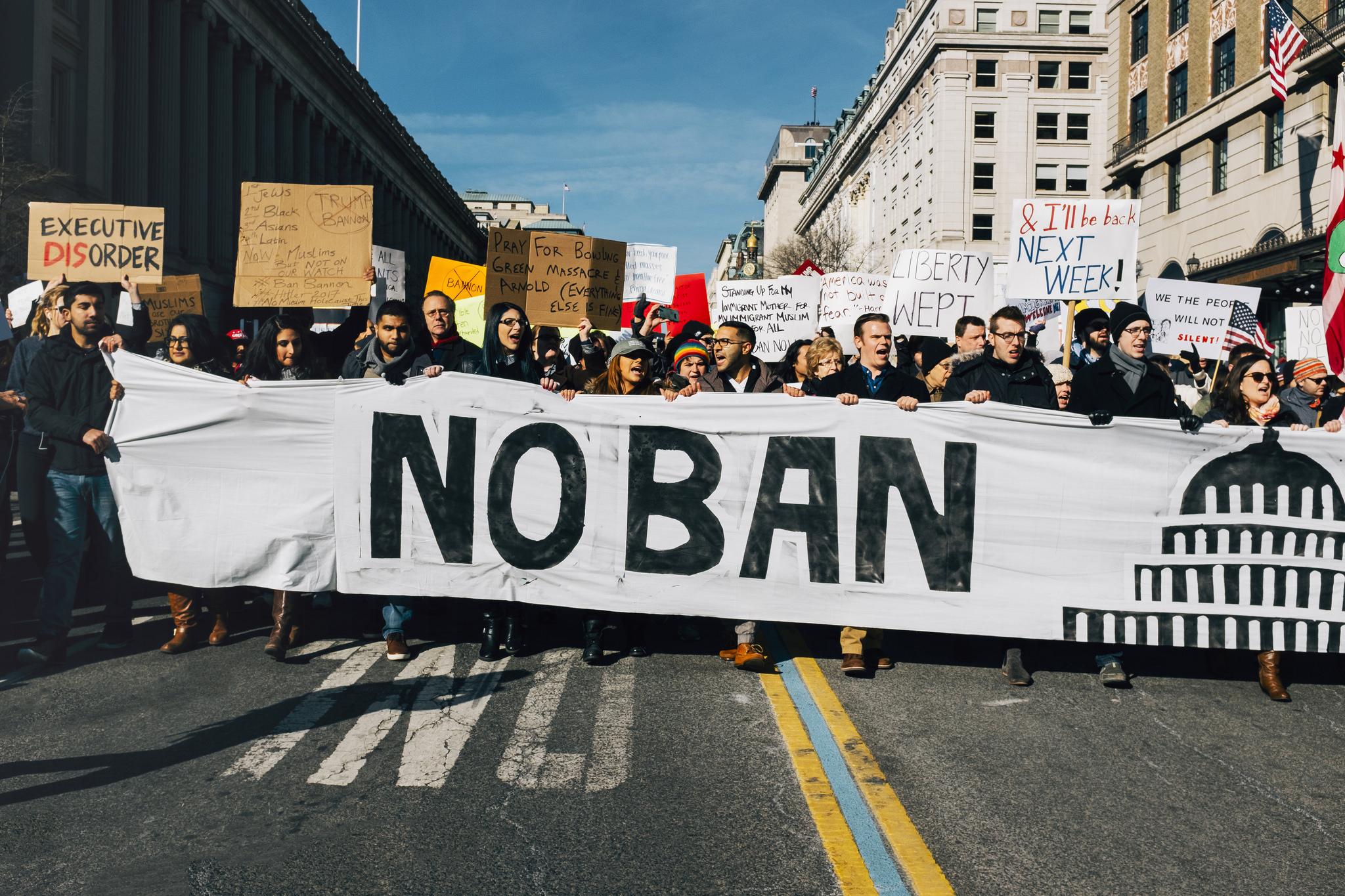
Urgent action is needed to protect people in the countries affected by the ban, but instead the U.S. is choosing to follow a dark history of legalized oppression.
Last week, the Supreme Court ruled that the third version of the racist Muslim ban could go into effect while legal challenges against it continue. Until the lower courts make their decisions, the Trump administration can enforce restrictions on travel from eight countries—six of them majority Muslim. This means that the government can now deny visas for people from those countries indefinitely, even if they have a “bona fide” relationship with the U.S.—including grandparents and grandchildren of permanent residents.
Even before last week’s decision, communities across the country had already felt the harm inflicted by the Muslim ban, which stoked Islamophobic sentiment, giving power to fear-mongering tactics not unlike those used to justify the internment of Japanese-Americans. In just the past few months, we have seen teachers call the police on an elementary school child with Downs Syndrome, Muslim girls being stripped of their hijab in schools, and countless other ways the Muslim community continues to be violated, assaulted, and demonized in an attempt to rob them of autonomy and agency.
What’s significant about Monday’s Supreme Court decision is that this is the first time that any version of the ban has been allowed to go into full effect, notes immigration lawyer Hassan Ahmad, a board member of the Virginia Coalition for Immigrant Rights.
And while immigration policy experts and lawyers have pushed back against this ban in the courts, local government, and in the arena of public opinion, we know that this racist policy is just another example of how white supremacy has historically legalized oppression of people of color to maintain systemic power.
Unfortunately, when we read about the Muslim ban, we don’t often hear about the scores of individuals and families who will be affected by the policy—and the reasons many of them leave their home countries for the U.S. 
Here’s a look at the human impact of this ban and the conditions individuals face in the Muslim-majority countries affected.
Yemen: Last week, former Yemeni president Ali Abdullah Saleh was assassinated amid an already disturbing humanitarian crisis - a worsening famine that is threatening the lives of millions of Yemeni people. However, instead of working to relieve the increasing turmoil in Yemen, the Trump administration instead is banning those very people who are vulnerable to starvation and conflict.
Libya: A recent CNN report exposed the ongoing enslavement of Black migrants in Libya who are captured, kidnapped, auctioned, and sold into forced labor. Instead of working with the Libyan authorities or publicly denouncing these heinous crimes against humanity—and using this opportunity to begin to rectify the sin and stain of slavery on U.S. history—America has focused on furthering oppression through this ban on Libya.
Chad and Somalia: The U.S. is again feeding into anti-Black racism by banning migrants from Chad, the fifth largest country in Africa, as well as from Somalia—a country that is currently experiencing one of the worst droughts in its history and continues to face the devastating and fatal impacts of civil war, food insecurity, and displacement.
Syria: Last week, the Pentagon announced that the U.S. military will stay in Syria indefinitely. With the Syrian refugee crisis being the largest refugee crisis of our time, with millions of Syrians displaced, it’s critical that we examine the power dynamics and systems at play that allow for the U.S. military to claim presence in Syria as an occupying and imperialist force while banning the presence of Syrians in the U.S.
Urgent action is needed to protect the lives of these vulnerable populations, but instead the U.S. is choosing to follow a dark history of legalized oppression.
For numerous individuals from these countries and their families here in the U.S., the impacts of the Supreme Court decision will be severe and far reaching. That means a refugee family in Somalia with plans to resettle in the U.S. are now barred. A young person from Iran accepted into university in the U.S. would no longer be allowed. A grandfather in Libya would not be allowed to attend his grandchild’s wedding in the U.S. 
As a member of the Muslim community, I have seen firsthand the devastation of a mother repeatedly being denied a visa to travel to the U.S. to be with her dying daughter. This ban robs our society of basic humanity, barring 150 million people, the vast majority of them Muslim.
It’s important to remember that the Supreme Court decision is not the end of the story. Last week, both the Ninth Circuit Court of Appeals and Fourth Circuit Court of Appeals heard arguments challenging this ban. And both courts’ decisions are expected to be appealed to the Supreme Court.
As these cases move forward, we must continue to speak out against this racist ban, and urge Congress to do the same. At AFSC, we will continue to pressure the government to welcome refugees and implement humane immigration policies that respect the dignity of all people. And in cities across the U.S., we’re working to end profiling and surveillance programs that target Muslim communities.
All of us deserve to feel safe from hatred and to live and pray in peace. For more resources about how you can oppose Islamophobia—and engage others in our efforts—explore our Communities Against Islamophobia resources.